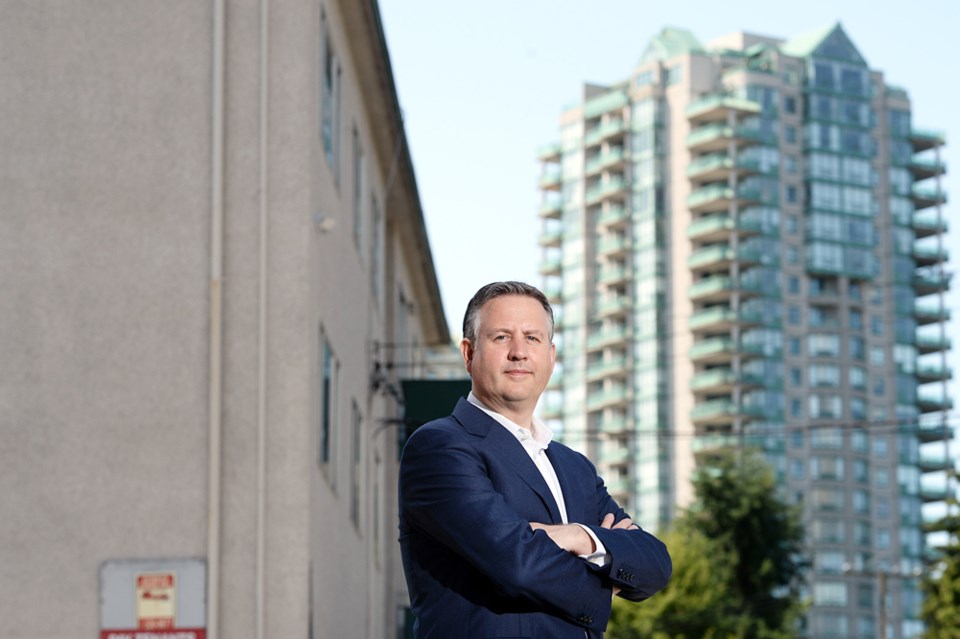When Kennedy Stewart was a child, his parents bought a home in rural Nova Scotia. As the Burnaby South MP tells it, they were a middle class family that did nice middle class things, and everything was fine until interest rates went up in the late 1970s.
“It was a really traumatic and shocking change,” Stewart said.
His parents lost their home of five years, and everything was auctioned off. They moved to a backwoods hunting cabin, built by Stewart’s grandfather, and stayed there for five years, burning wood for heat and fetching water from a nearby lake.
Stewart rode the school bus alongside other kids who had lived this poverty for generations.
“And that affected me in terms of going from a spoiled rich kid to somebody who thought we’ve got to do something about this,” he said.
He got involved in his first election as a teen and was hooked, but he’s also been wary of home ownership ever since. Even now, with his political career and a tenured teaching position at SFU to fall back on, he’s staying out of the housing game.
When Stewart’s old Burnaby Douglas riding changed boundaries, he ran in South Burnaby instead. He and his wife sold their North Burnaby condo, and they’re not planning to buy again anytime soon.
“For me, when we bought in North Burnaby, that’s the first time I ever owned a house. I never really felt it important to own property, but I thought maybe as a new MP that would be a good thing to do. But really, my preference has always been to rent,” he told the NOW.
Stewart declined to say how much he spent on the two-bedroom home; but it “wasn’t cheap,” and they broke even after the sale.
“Even with the salary of an MP, I felt uncomfortable with the amount of money we spent on our condo,” he said. “It actually caused us a lot of stress.”
As far as Stewart’s concerned, anyone who spends more than a third of their income on housing is in trouble, and people have been buying homes as investments and getting in over their heads.
“From my parents’ experience and what we know from other housing markets, and I’ve advised internationally on this, is that the musical chairs game stops at some point, and who it stops for is the people who are over-leveraged,” he says.
Media stories on the frenzied real estate market contribute to panicked-purchases, according to Stewart, who thinks there could be a correction on the horizon.
“The thing is what you’re seeing in the media is a right-of-centre, free market discussion of our housing. You’re looking at people who always think you have to leave it to the market to sort it out, and that doesn’t work anywhere,” he said.
Instead, Stewart wants to shift the focus to public housing and put the burden of responsibility on the federal government.
“Everybody yells at the (Burnaby) mayor and council, and that’s not fair, because traditionally, in every other city in the world, it’s always been the national government,” he said. “We stopped investing in the `90s, and now my constituents are feeling the crunch. We have around 2,000 co-op units in Burnaby, but the building really stopped in the `90s. If we had invested in housing through that whole period, there would have been double the number of places for families to start off.”
Stewart also thinks the foreign ownership issue is overblown.
“What I don’t like is when this dips into racism, and it kind of goes there pretty quickly. People blame a certain culture for an increase in prices, and that’s just not proven by the data,” he said.
According to the provincial government’s latest numbers on foreign ownership in Burnaby, there were 662 properties transferred between June 10 and July 14, and out those, 117 involved foreign nationals. That figure represents 17.7 per cent of the market and reflects roughly $81 million.
Meanwhile, developers are razing low-costs rental apartments in Burnaby’s Metrotown area to make way for highrise buildings. One of those apartments slated for demolition is Stewart’s first Burnaby home on Wilson Avenue. He moved there in 1988, after coming out West with $500 in his pocket, looking for work. He slept on an army cot until he could afford a mattress.
“Remembering where I came from pushes me to make sure others have the same opportunities I had to make better lives for themselves,” he said. “Without these types of homes people won't have the same chances I had. That's not right.”
Stewart said what’s happening in Burnaby is happening across the country: the standard of living for middle- and low-income people is eroding as federal and provincial governments cut policies that help people move up the economic ladder.
Stewart plans to stay out of the red hot real estate market, and he’s not worried he’s throwing his money away on rent.
“How you’re really throwing your money away is if you buy a house for $500,000 and in 10 years it’s worth $400,000,” he said. “The best investment people can make is in themselves. Education, skills, upgrades – that is the number 1 investment you can make because you can never lose it.”



